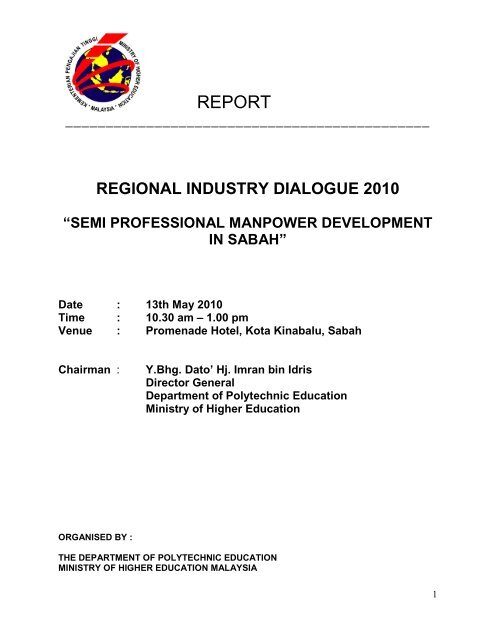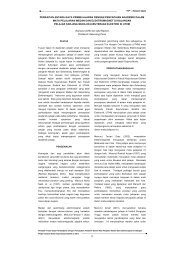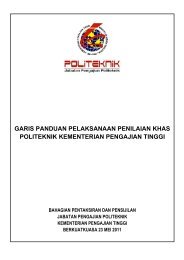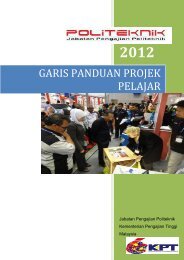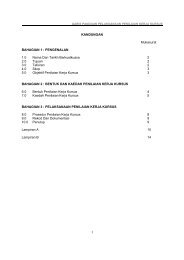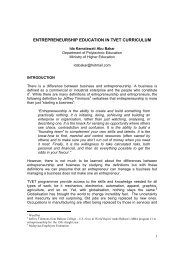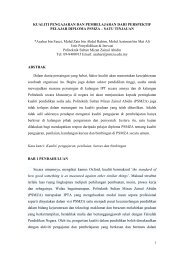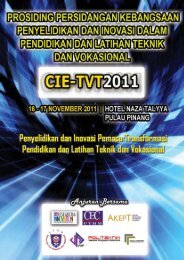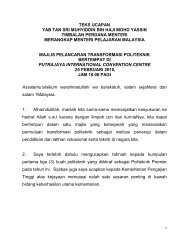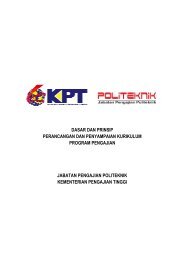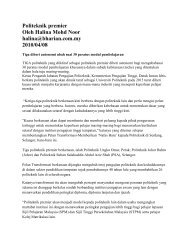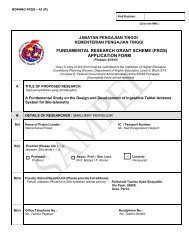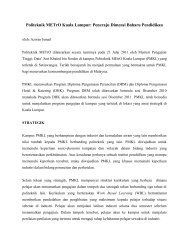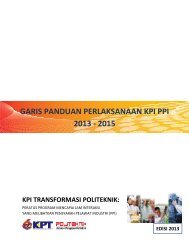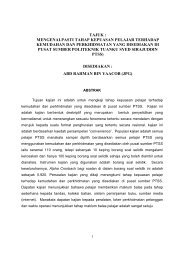organised by - Jabatan Pengajian Politeknik
organised by - Jabatan Pengajian Politeknik
organised by - Jabatan Pengajian Politeknik
Create successful ePaper yourself
Turn your PDF publications into a flip-book with our unique Google optimized e-Paper software.
REPORT<br />
_____________________________________________<br />
REGIONAL INDUSTRY DIALOGUE 2010<br />
“SEMI PROFESSIONAL MANPOWER DEVELOPMENT<br />
IN SABAH”<br />
Date : 13th May 2010<br />
Time : 10.30 am – 1.00 pm<br />
Venue : Promenade Hotel, Kota Kinabalu, Sabah<br />
Chairman :<br />
Y.Bhg. Dato’ Hj. Imran bin Idris<br />
Director General<br />
Department of Polytechnic Education<br />
Ministry of Higher Education<br />
ORGANISED BY :<br />
THE DEPARTMENT OF POLYTECHNIC EDUCATION<br />
MINISTRY OF HIGHER EDUCATION MALAYSIA<br />
1
TABLE OF CONTENTS<br />
Contents<br />
Page<br />
EXECUTIVE SUMMARY 3<br />
PREFACE 6<br />
PROCEEDINGS : 6<br />
Keynote Address : Collaborating for Workforce Capacity Building –<br />
Engaging Industries<br />
Y.Bhg. Dato’ Hj. Imran bin Idris<br />
Director General, DPE<br />
Presentation : Sabah Development Corridor : Needs and Perspectives<br />
Ms. Janiah Zaini<br />
Assistant Vice-President, Sabah Economic Development<br />
& Investment Authority (SEDIA)<br />
QUESTION & ANSWER SESSION 9<br />
CONCLUDING REMARKS 14<br />
2
EXECUTIVE SUMMARY<br />
The 2010 Luncheon Dialogue, themed “Semi Professional Manpower Development in<br />
Sabah” is the first luncheon dialogue, organized <strong>by</strong> the Department of Polytechnic<br />
Education (DPE), Ministry of Higher Education (MoHE).<br />
This regional dialogue has a two-fold objective. First, to enable DPE to gain better<br />
understanding and grasp of the needs of industries nationwide. The input will be used<br />
for developing and reviewing the polytechnic curriculum and training programs to<br />
ensure the right match between workforce produced and industry needs. Secondly, to<br />
enhance existing industry-institution collaboration in Sabah.<br />
The Director General, in his keynote address, reiterated the importance of strong<br />
academia industrial ties to enable polytechnics to produce graduates capable of<br />
meeting the challenges in the job market. His keynote address, “Collaborating for<br />
Workforce Capacity Building – Engaging Industries”, provided an overview of the<br />
Technical and Vocational Education Training (TVET) system in Malaysia followed <strong>by</strong><br />
programs available at polytechnics. DPE’s Collaboration Model which has produced<br />
several desired outcomes were highlighted. Amongst the desired outcomes mentioned<br />
were the Industry Advisory Committee, the Employability Advisory Committee, the 1-<br />
STOP Corporate Industry Services & Employment Centre (CISEC), the Annual National<br />
Industry Dialogues, special focus group discussions, knowledge sharing <strong>by</strong> guest<br />
lecturers from foreign universities, overwhelming response from industries for staff and<br />
student’s industrial placement and signing of MoUs with well-known local and<br />
international companies.<br />
The Assistant Vice President of the Sabah Economic Development & Investment<br />
Authority (SEDIA) spoke on “The Sabah Development Corridor (SDC) : Needs and<br />
Perspectives”, touching on strategies in the SDC’s blueprint to turn Sabah into a high<br />
3
value manufacturing and services centre through rapid development in agriculture,<br />
tourism, manufacturing and logistics. The presentation also showed how SDC’s<br />
strategic development thrusts in the four areas will enhance human capital<br />
development, move Sabah up the value chain, reduce regional imbalances and<br />
increase participation in the K-economy. The presentation also showed how the goals,<br />
characteristics and strategic reform initiatives contained in the New Economic Model<br />
(NEM) will help Sabah deal with the challenges posed <strong>by</strong> the nation’s current economic<br />
slowdown. The last part of her presentation touched on the importance of quality<br />
education and training to produce a creative and critical workforce. This, together with<br />
an industry driven curriculum, upgrading of skills in line with market needs and<br />
availability of short technical and vocational programs for the non-academically inclined<br />
were pointed out as strategies for moving forward.<br />
The issues raised in the Question and Answer session can be categorized into three<br />
main categories : labor, curriculum/programs and outline perspectives contained in the<br />
SDC.<br />
Labor<br />
The acute labor shortage in the timber and oil palm industry is the result of paradigm<br />
changes which have taken place in these industries, which demand new skills from the<br />
existing workforce. These challenges have been further aggravated <strong>by</strong> an over<br />
dependence on foreign labor. These challenges brought to light the importance of<br />
having in place mechanisms suitable for different sectors of the industry which will<br />
ensure smooth adjustments in the labor market.<br />
Curriculum/programs<br />
Positive response received from participating industries to work together to further<br />
enhance the curriculum, especially training of skilled manpower in the oil palm industry<br />
in the three critical areas – mechanical, bio-technology and agriculture technology.<br />
Other suggestions include incorporating coal fire technology in the finishing school<br />
program, having work-based learning programs to overcome the cost and time<br />
4
constraints of developing new curriculum. Concern was expressed over the phasing out<br />
of polytechnic certificate level programs.<br />
Outline perspectives in the SDC<br />
The main concerns were related to challenges faced in achieving the desired outcomes<br />
given the present economic slowdown and availability of grants for young<br />
entrepreneurs.<br />
A Dialogue Survey was carried out during the Regional Dialogue Industry. 91.8% of<br />
industry participants responded to the survey. The findings revealed that 87.5% of the<br />
respondents were interested to collaborate with DPE in the following areas : students’<br />
industrial training, conducting short term courses, giving career talks, sharing their<br />
expertise for curriculum development, industrial placements for polytechnic staff,<br />
students’ final semester project, become guest lecturers and advisory committee<br />
members, presentation of papers at seminars and conferences. 37.5% responded that<br />
they already have polytechnic graduates working in their organizations and are highly<br />
satisfied with their performance and attitude (integrity, quality of work, teamwork and<br />
overall performance). However, there was still room for improvement in the<br />
communications area.<br />
The issues raised during the Question & Answer session and the findings of the<br />
dialogue survey call for the following course of action :<br />
♦<br />
♦<br />
♦<br />
Further institution-industry networking<br />
Curriculum development that caters to the developments in the timber and<br />
palm oil industries in Sabah.<br />
Working closely with industries to ensure skills of workforce match industries’<br />
requirements, improving student employability.<br />
5
PREFACE<br />
The 2010 Regional Industry Dialogue, themed “Semi Professional Manpower<br />
Development in Sabah”, is the first to be held in Sabah. The dialogue, organized <strong>by</strong> the<br />
Department of Polytechnic Education, Ministry of Higher Education, is aimed at<br />
enhancing existing ties with the industries as well as obtaining a better understanding of<br />
the skills needed <strong>by</strong> the industries nationwide to ensure the correct match between<br />
workforce produced <strong>by</strong> polytechnics and needs of the industries.<br />
61 participants from 55 organizations and 43 senior officers from the Ministry of Higher<br />
Education and polytechnics attended the dialogue.<br />
PROCEEDINGS<br />
KEYNOTE ADDRESS : Collaborating for Workforce Capacity Building –<br />
Engaging Industries<br />
Presenter<br />
: Y.Bhg. Dato’ Hj. Imran Bin Idris<br />
Director General, DPE<br />
The Director General highlighted the importance of strong academia industrial ties to<br />
enable polytechnics to have a good understanding of the type of skills required <strong>by</strong> the<br />
industries in this very FIRST Luncheon Dialogue held in Sabah. Dialogues from such<br />
ties will provide invaluable input for the development of an industry-relevant curriculum,<br />
introduction of industry-driven programs, preventing mismatches between needs of<br />
industries and workforce produced <strong>by</strong> institutions.<br />
The Director General proceeded to present an overview of the Technical and Vocational<br />
Education Training (TVET) system in Malaysia followed <strong>by</strong> the programs available at<br />
polytechnics.<br />
He further elaborated on DPE’s Collaboration Model which comprises three main areas<br />
– Industry Input, Industry-Institution and Institution Output. The importance of gathering<br />
input for curriculum development through meetings with its Industry Advisory Committee<br />
6
(IAC) was mentioned. The IAC, made up of industry captains from various sectors of<br />
the industry, is established at both institutional as well as departmental levels. The<br />
Director General also pointed out that the four national annual industry dialogues have<br />
provided an invaluable platform to gather input for curriculum and workforce<br />
development. The practice of having small focus groups, comprising industry experts to<br />
deliberate on specific issues, as in the recent Round-Table Discussion on the 2010<br />
Polytechnic Transformation Plan, was also highlighted. The keynote address also<br />
showed that DPE’s industrial linkages have resulted in guest lecturers from foreign<br />
universities sharing their expertise in a number of Professional Tea Talks and Logistics<br />
Seminars.<br />
The address also drew participants’ attention to various collaborations between DPE<br />
and its institutions which have greatly benefitted both staff and students of the<br />
polytechnics. 8200 companies/agencies have come forward and offered places for<br />
industrial attachment for 37,300 polytechnic students. Polytechnic staff have also<br />
benefited from these industrial linkages. 63 of polytechnic staff were attached to 60<br />
firms in 2009. Industries have benefitted through customized training programs<br />
designed specially for their staff. MoUs signed with local as well as international names<br />
such as Malaysian Airlines System, CISCO, Faber, NGV Tech SDN BHD, Siemens,<br />
MAH Kedah/Perlis were also highlighted. The Director General also made special<br />
mention of Proton - DPE’s partner in work-based learning. Other developments under<br />
Institution Output highlighted plans for establishing the Employability Advisory<br />
Committee and a 1–STOP Corporate Industry Services & Employment Centre (CISEC)<br />
where institutions and industries can work together to enhance workforce capacity<br />
building.<br />
The Director General concluded his keynote address <strong>by</strong> stating that polytechnics have<br />
the potential to become regional TVET institutions with the capacity to produce<br />
graduates with the required certifications for various sectors. In a nutshell, this dialogue<br />
is the best platform to engage institution-industry’s commitment in a two-way<br />
relationship for mutual benefits.<br />
7
Presentation : Sabah Development Corridor : Needs and Perspectives<br />
Presenter : Ms. Janiah Zaini<br />
Assistant Vice President -Sabah Economic Development &<br />
Investment Authority (SEDIA)<br />
Ms. Janiah Zaini gave an overview of the SDC blueprint, the impact on human capital<br />
needs, challenges faced and the way forward in her presentation on the “Sabah<br />
Development Corridor : Needs and Perspectives”.<br />
The presentation revealed strategies in the SDC Blueprint to turn Sabah into a high<br />
value manufacturing and services centre <strong>by</strong> leveraging on Sabah’s strength in<br />
agriculture, tourism and natural resources within the time-frame from 2008 -2025. The<br />
presentation pointed out that the first stage of development will focus on infra-structure<br />
building and high economic impact and poverty eradication projects, followed <strong>by</strong> higher<br />
order value added activities to accelerate growth and attract foreign direct investments.<br />
The second part of the presentation which dealt with the impact on human capital needs<br />
elaborated on the direction of the agenda and SDC’s strategic development thrusts.<br />
The areas earmarked for development are agriculture, tourism, manufacturing and<br />
logistics. The expected outcomes of these developmental thrusts are the enhancement<br />
of human capital, moving Sabah up the value chain, reducing regional imbalances and<br />
increased participation in the K-economy.<br />
The third part touched on challenges faced given the country’s economic slowdown. It<br />
also provided information on the goals, characteristics and strategic reform initiatives<br />
contained in The New Economic Model. The presentation highlighted the importance of<br />
developing a quality workforce through quality education while simultaneously reducing<br />
the dependency on foreign labor as a strong talent base will improve productivity and<br />
provide the foundation for sustained economic growth.<br />
8
The last part of the presentation shared pointers on the way forward. The importance<br />
of quality education and training which prioritizes growth and the production of a<br />
creative and critical workforce, an industry driven curriculum, upgrading one’s skills and<br />
the provision of short technical and vocational programs for the non-academically<br />
inclined were cited as strategies for the way forward.<br />
QUESTION & ANSWER SESSION<br />
Panelists : -<br />
1) Y.Bhg. Dato’ Haji Imran bin Idris<br />
Director General, DPE<br />
2) Ms Janiah Zaini<br />
Assistant Vice-President<br />
Sabah Economic Development & Investment Authority<br />
(SEDIA)<br />
3) Y.Bhg. Datuk Ir. Chong Hon Lee<br />
Chief Executive Officer KKIP Sdn. Bhd.<br />
Question 1 : Mr Fong Ming San – Sabah Timber Industry Association<br />
Much emphasis has been given to downstream activities and clusters in KKIP. Special<br />
attention should be given to downstream activities in tree plantation. The set skills and<br />
the type of skilled personnel needed for tree plantation are quite different from the skills<br />
required in traditional planting which just involves cutting the trees and transporting to<br />
the mills. In tree plantation, the whole process, starting from clearing the forests,<br />
planting the trees, field culture, harvesting, transporting and finally back to the mills, has<br />
to be carefully planned. Statistics indicate that there is an acute shortage of skilled<br />
personnel to deal with the paradigm changes that has taken place in the planting and<br />
agriculture industries. It is hoped that our input regarding the critical shortage of<br />
personnel with the required skills would be addressed as soon as possible. It should<br />
also be noted that we appreciate this opportunity to provide input for curriculum<br />
development and review as tree planting is envisaged to become the next major supply<br />
of the raw materials for the timber industry.<br />
Response : Y.Bhg. Dato’ Haji Imran<br />
The suggestion will be noted. <strong>Politeknik</strong> Sandakan will address the issues mentioned.<br />
As mentioned earlier to Datuk Chong, today’s session is a networking session,<br />
providing a platform for DPE and its institutions to know the needs of the industries<br />
9
efore coming out with more detailed and concrete arrangements which would benefit<br />
both parties.<br />
Question 2 : Mr Ismail Salkilan – Sawit Kinabalu<br />
Noticed that there are no provisions in the polytechnic curriculum to train skilled<br />
personnel to work in the oil palm industry even though Sabah has the largest oil palm<br />
plantation in Malaysia. The Sabah oil palm industry is facing a number of challenges as<br />
a result of labour shortage due to the high turnover rate and difficulty in recruiting<br />
resources with the right agricultural background. To solve this problem, Sawit Kinabalu<br />
has started some collaboration with UMS especially in the area of management and<br />
milling technology. Sabah is expecting a new quantum leap into downstreaming eg. the<br />
development of POIC in Lahad Datu and Sandakan which is adjacent to the education<br />
hub. Sandakan will be an important area for regional development. It is hoped that<br />
<strong>Politeknik</strong> Sandakan will be able to support POIC in terms of producing the required<br />
human resources as well as help the industry in its downstreaming activities - in<br />
mechanical, bio-tech or agri-tech as these are the present critical areas. Sawit Kinabalu<br />
will be spearheading the SDC project <strong>by</strong> SEDIA. <strong>Politeknik</strong> Sandakan should be a part<br />
of this project so as to support the oil palm industry. The polytechnic can collaborate<br />
with MPOV for example, in R&D and commercialization. This will help overcome the<br />
potential crisis faced <strong>by</strong> Malaysia’s over reliance on foreign workers.<br />
Response : Y.Bhg. Dato Haji Imran bin Idris<br />
Polytechnics will be focusing more on the supply of workforce to cater to downstream<br />
activities. An effective way to expedite the introduction of new programs is to work<br />
together with a company/companies that can provide the infrastructure. Polytechnics<br />
will oversee the curriculum design, the theoretical aspects as well as the basic lab<br />
experiences while companies should be ready to provide the industrial experience for<br />
these students. <strong>Politeknik</strong> Kota Kinabalu will discuss with Sawit Kinabalu to come up<br />
with a draft to address needs of the palm oil industry.<br />
Question 3 : Datuk Ag Buhtaman Ag Mahmun – Dewan Perniagaan Melayu<br />
Economic development spearheaded <strong>by</strong> SEDIA requires a steady supply of both<br />
professional and semi professional skilled manpower from many disciplines, ranging<br />
from tourism to manufacturing. It would be unfair to expect polytechnics alone to solve<br />
the issues pertaining to fulfilling the human resource requirements of the industries. A<br />
more feasible alternative is to look into existing programs available at the polytechnics<br />
and see how best to collaborate with appropriate industries to ensure a supply of the<br />
required manpower.<br />
The New Economic Model consists of plans for (a) increasing the per capita income of<br />
the population at large (b) inclusiveness and equal distribution of growth and (c)<br />
sustainability. Some clarification is needed concerning the issue of increasing the per<br />
capita income of the people of Sabah to RM14,784 <strong>by</strong> 2025. It is stated in the New<br />
Economic Model that the existing average per capita income be increased to RM49,500<br />
10
y 2025. If that is the case, the target is still short of more than RM30,000 and this<br />
issue needs to be addressed. Given the current economic slowdown in Malaysia, what<br />
are the strategies that will be deployed to achieve the target of RM 49,500 per capita<br />
income <strong>by</strong> 2025.<br />
Industries appear to be in a dilemma as to the type of recognition to be given to<br />
polytechnic graduates. Polytechnic graduates who are diploma holders are classified<br />
as middle level semi-professionals. However, their education and training have<br />
equipped them with skills and knowledge above the requirements of middle level semiprofessionals,<br />
but they cannot be recognized as engineers.<br />
It would appear that work-based learning is a good place to start institution-industry<br />
collaboration to overcome the high cost and time-constraint of developing a new<br />
curriculum to meet pressing needs of the industries.<br />
Response: Ms Janiah Zaini<br />
Confident that plans to increase the existing average per capita income from RM23,100<br />
to RM49,500 <strong>by</strong> 2025 is achievable in the light of the special emphasis given <strong>by</strong> SDC,<br />
the strategic initiatives pursued <strong>by</strong> the government to reform the workforce and the<br />
national agenda to move the country from the middle income to a higher income country<br />
<strong>by</strong> 2025. Economic experts, in a recent briefing, explained that the economy only<br />
needs to grow <strong>by</strong> 6% yearly to achieve this objective.<br />
Response: Y.Bhg. Dato Haji Imran bin Idris<br />
Polytechnics are not in a position to address all problems related to shortage of skilled<br />
manpower faced <strong>by</strong> the entire industry as programs in polytechnics are generic in<br />
nature. Our programs try to cater to the needs of various sectors. The concept of<br />
Finishing Schools is our stop gap measure to address the specific skills of a particular<br />
sector of the industry. The Finishing Schools try to bridge the gap between what<br />
industry’s requirements and what is provided in the formal program. Only particular<br />
skills, found to be needed <strong>by</strong> the industry, will be embedded in our formal program.<br />
This strategy is adopted during curriculum is being reviewed, resulting in a more flexible<br />
and dynamic curriculum.<br />
Question 4 : Dr. Zhambree Gulam Rasul - Institut Usahawan Muda<br />
Any grants allocated for young entrepreneurs to participate in SME development<br />
programs?<br />
Response : Ms Janiah Zaini<br />
One of our focus areas is the SME development and we work closely with training<br />
providers such as polytechnics, SIRIM and MARDI. Grants are allocated for skills<br />
training and development of young entrepreneurs.<br />
11
Question 5: Mr Baharuhom K.K Sugon - <strong>Jabatan</strong> Kerja Raya<br />
Is it true that the certificate level programs will be phased out? If so, when will the<br />
exercise commence and who will take up this responsibility of training certificate level<br />
staff?<br />
Is the Diploma level programs equivalent to the Diploma programs offered <strong>by</strong> the local<br />
universities?<br />
Response: Y.Bhg. Dato Haji Imran bin Idris<br />
Polytechnic certificate level programs will be phased out. In fact, starting this year –<br />
2010, polytechnics will no longer take in students for certificate level programs. The last<br />
cohort of polytechnic certificate level students to graduate will be one and a half years<br />
from now. It’s a bit difficult, at this point, to ascertain the training provider for certificate<br />
level programs. However, many other institutions like IKM, ILP and also community<br />
colleges still conduct certificate level programs.<br />
In terms of recognition, our diploma level programs is equivalent to the diploma offered<br />
<strong>by</strong> local universities. However, the approach used in polytechnic diploma level<br />
programs are slightly different from that of universities. Polytechnic diplomas enable<br />
their graduates to be industry ready, able to contribute productively at the workplace<br />
upon graduation. University diplomas, in comparison function as stepping stones to a<br />
degree program. Findings from the Tracer Studies show that the number of polytechnic<br />
diploma students getting employed upon graduation are much higher compared to a<br />
university diploma holder.<br />
Question 6 : Ms Zainurah Abdullah - SESB<br />
Have polytechnics ever considered embedding coal fire technology in their finishing<br />
schools because there is a demand for qualified personnel in this sector.<br />
Response : Y.Bhg. Dato Haji Imran bin Idris<br />
The finishing school is a stop gap measure. It is not possible to change the curriculum<br />
overnight. Only some of the important critical skills that require immediate attention are<br />
picked up and addressed in our finishing schools. However, your concern is noted and<br />
will be discussed during our curriculum development meeting.<br />
Question 7 : Mr Fong Ming San - Sabah Timber Industry Association<br />
Would like to inform participants that at the present moment, the timber sector has not<br />
found a robust matching mechanism where labor is concerned. The timber industry<br />
experience the perennial problem of having a smooth adjustment in the labor market. It<br />
is important to come up with a benchmark to see how well this so called labor market<br />
12
adjustment can be smoothened. It is timely for a robust discussion on the issue of<br />
foreign workers which will be sensitive to the needs of different sectors of the industry,<br />
as mechanisms which bring about change in one industry may not be applicable to<br />
another industry.<br />
Response : Ms Janiah Zaini<br />
We do recognize that benching mechanisms require a holistic approach where<strong>by</strong> all the<br />
departments or ministries or industries have to play their roles. Matching the supply and<br />
demand of our labor force is a difficult task which involves taking a lot of actions. The<br />
dependence on foreign labor is particularly high in the plantation and timber sectors of<br />
Sabah. Open discussions need to be carried out and this is where institutions of higher<br />
learning and industries need to work together to address the mismatch between the<br />
supply and demand of our labor force.<br />
Response : Y.Bhg. Dato Haji Imran bin Idris<br />
DPE welcomes all feedback to enable us to overcome our shortcomings and in the case<br />
of this discussion, we would like to take the opportunity to solicit as much feedback as<br />
possible for the future directions of our programs.<br />
Question 8 : Hj Isa bin Hj Ismail – <strong>Politeknik</strong> Sandakan Sabah<br />
Since polytechnics under MoHE have carried out measures to comply with the needs of<br />
industries at the present moment, can we have an indication of the commitment from<br />
industry, so that both parties can meet halfway and have a win-win situation?<br />
Response : Y.Bhg. Datuk Ir. Chong Hon Len<br />
Basically, polytechnics play an important function here. From what I observe, what is<br />
needed to make our product marketable is to improve the quality of the product required<br />
<strong>by</strong> the industries and polytechnics are doing a good job training quality skilled<br />
manpower in the respective areas.<br />
There is a lack of collaboration between the private sectors and institutions in Sabah.<br />
The NGOs which represent the industries are not well organized as they do not receive<br />
adequate funding. There is an urgent need for closer cooperation between the public<br />
and private sectors. In order to bridge the gap, I would like to see more of this kind of<br />
forum being organized.<br />
13
CONCLUDING REMARKS<br />
Y.Bhg. Dato’ Hj. Imran Bin Idris, Director General, DPE<br />
Y.Bhg. Dato’ Hj. Imran thanked all participants for their support and active participation<br />
in this dialogue. The Director General assured participants that such dialogues would<br />
continue to be held in Sabah in order to foster and establish strong relationships<br />
between the industry and the polytechnic. :<br />
The issues raised during the Question & Answer session will be addressed through :<br />
♦ Further institution-industry networking<br />
♦ Curriculum development that caters to the developments in the timber and<br />
palm oil industries in Sabah.<br />
♦ Working closely with industries to ensure skills of workforce match industries’<br />
requirements, improving student employability.<br />
14


